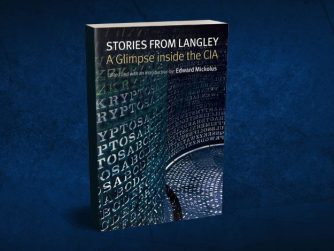This review was published in the Association of Former Intelligence Officers (AFIO) publication, Intelligencer: Journal of US Intelligence Studies, Winter-Spring 2022 issue.
Spycraft for Thriller Writers – How to Write Spy Novels, TV Shows and Movies Accurately and Not Be Laughed at by Real-Life Spies, by Edward Mickolus, Wandering Woods Publishers, 2021, 112 pages with Spy-Fi Trivia, Questions and Further Reading List
Former CIA officer and prolific author, Dr. Ed Mickolus, has a new book that can best be described as fun. Its thesis is encapsulated in the subtitle. He starts with a succinct description of Intelligence Community organizations with emphasis on the FBI and expanded description of CIA, the two organizations most often depicted in novels and on the screen.
Mickolus briefly describes how things get done in the IC, explains the intelligence cycle and how a recruited spy is spotted, assessed, vetted, pitched, and managed. He explains that it is a long and difficult process and unlike what is depicted on TV. He clarifies terminology: that the FBI has “special agents,” but the CIA has “operations officers.” For CIA “agents” are those who have been recruited to spy for the US.
He corrects the popular notions of CIA officers being “super heroes” with “genius-level linguistic skills,” who engage in conspiracies, and save the world by themselves.
One section of the book depicts a visit to CIA Headquarters and shows many of the exhibits displayed including an A-12 Oxcart, MI-17 helicopter, a fragment from the Berlin Wall, and Usama Bin Laden’s personal AK-47. He also explains how analysts are tied together across the Agency and community by Intellipedia and Intelink.
Reviewers are supposed to point out mistakes in books. One jumped out: there are now 17 IC organizations (plus the ODNI) with the addition of Space Force (which obviously joined the IC after the book was written). This is a useful volume for intelligence neophytes, thriller writers, and should be provided to every journalist.
Speaking truth to power. This reviewer’s son is a Hollywood TV writer whose past credits include CBS’s CIA-set The Agency and NBC’s Pentagon-set E-Ring. Years ago, I was invited to talk in his Writers’ Room, and spent an afternoon debunking the then-popular Jason Bourne solo-operator concept, explaining what intelligence was (not instant CNN), the analytical process and how long it could take, the concept of a consumer, and the intelligence cycle. The writers were full of questions and seemed appreciative of getting “an insider’s view.” But afterward my son explained the cold truth – that network TV requires escalating conflict over the “acts” between commercial breaks (to sell shampoo and cars) and that the hero(es) solving the mission by hour’s end brings back the audience for a new mission/new advertisements the following week…. So much for reality.
–






